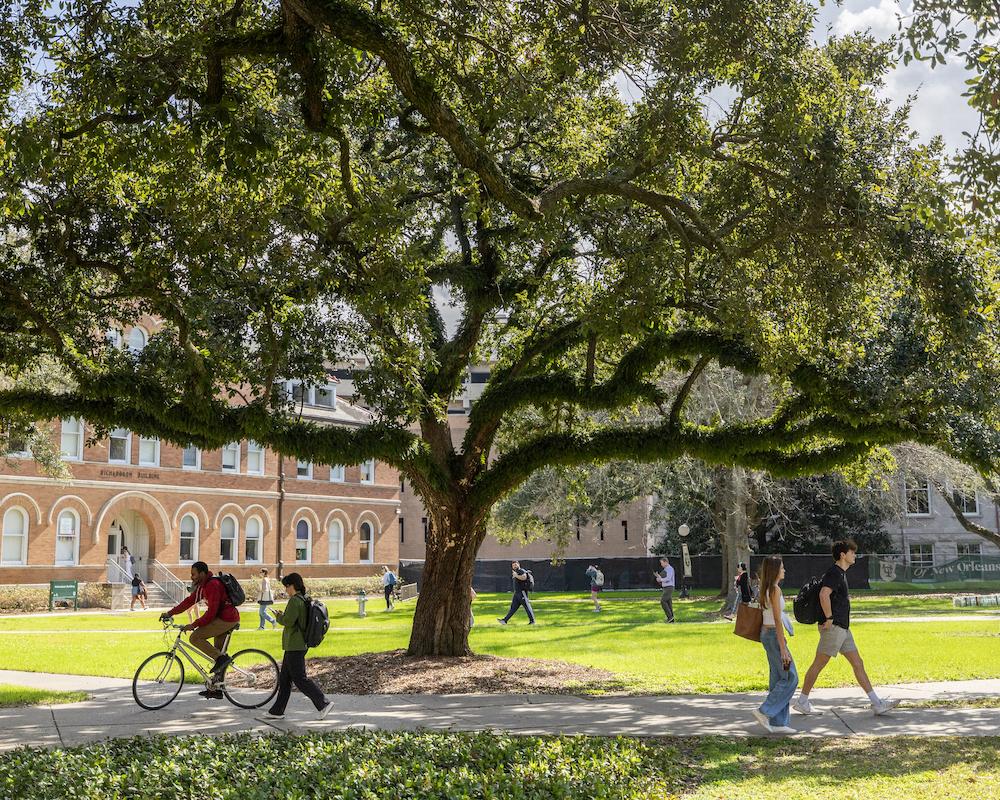Community engagement at the heart of campus safety strategy
At Tulane University, the well-being of students, faculty, staff and neighbors is a shared responsibility and a core institutional priority.
Tulane recently released its crime statistics from 2024, which revealed a significant decrease in incidents across all Tulane campuses. The data reflects continued progress in public safety, including reduced theft, vandalism and other property crimes.
Tulane Today spoke with Tulane’s Associate Vice President of Public Safety & Community Engagement Kirk Bouyelas about the latest crime trends and the department’s continued efforts to improve safety on Tulane’s campuses and in surrounding neighborhoods.
What is Tulane’s overall approach to safety?
Bouyelas: Tulane University Police Department (TUPD) focuses on crime prevention, rapid response and collaboration with local law enforcement agencies. The department also monitors crime trends and adapts patrol strategies to address emerging issues quickly and effectively. We are committed to fostering a safe environment for all.
Our mission is built around what we call the “3Cs”: Crime, Community and Cops. This framework guides everything we do.
We relentlessly combat crime and disorder through service-oriented, constitutional, ethical and professional policing. We treat everyone we encounter with dignity and respect.
Our community includes students, staff, faculty, affiliates and visitors. We are committed to working collaboratively with all community members using best practices in community-oriented policing, regardless of geographical boundaries.
We invest in our officers by ensuring they have the training and resources they need to succeed. We view the care and well-being of our personnel as a shared responsibility, and we support our team through every situation they may encounter.
What is TUPD doing to stay engaged with the community?
Bouyelas: TUPD provides patrol coverage within a one-mile perimeter of the uptown and downtown campuses, including areas of the Central Business District. This allows TUPD to support public safety beyond university grounds.
We have also opened two additional TUPD stations: one on Broadway Street near the uptown campus and one in the downtown medical corridor on Tulane Avenue. These stations improve response times and enhance our visibility in nearby neighborhoods.
Are there specific programs that support community safety?
Bouyelas: Officers use a mix of walking and bicycle patrols, along with three-wheeled scooters, to increase visibility and connect with students, residents and others in the Tulane community. This approach builds trust and supports a safer environment.
One key initiative is Operation Safe Package, which helps prevent package theft in neighborhoods near campus by securing unattended deliveries. TUPD officers monitor areas with frequent deliveries and, when possible, move packages out of view or store them temporarily at designated locations until the resident can retrieve them. The program has significantly reduced theft and remains an important part of our community engagement efforts.
We also have a K-9 unit featuring Max, a Labrador trained in explosives detection. Max supports event security and building sweeps and helps strengthen relationships between officers and the community.
What are the current crime trends on Tulane’s campuses?
Bouyelas: Crime across all Tulane campuses, which was already low, dropped by 32% in 2024 compared to 2023. Overall crime has decreased by 42% since 2019.
Property crime saw the most significant decline, dropping 50% in the past year and 57% since 2019. Reductions in theft and vandalism have further strengthened the sense of safety on campus and in nearby neighborhoods.
How do you and your team prepare the university for emergencies?
Bouyelas: Keeping our campus safe during an emergency, whether it's an active threat, severe weather or another challenge, means being prepared before something happens. Our department collaborates with campus partners, local police and emergency services so we can respond quickly and effectively.
One of the most important things students, faculty and staff can do is make sure they're signed up for the Everbridge app, the university's emergency notification system. It's how we send out real-time alerts and instructions during an emergency, and it can make a big difference in keeping you informed and safe.
We will continue to conduct safety drills, update our plans and provide training opportunities, but safety is a shared responsibility. The more prepared our whole community is, the stronger and safer we will be.


